Baylor Scott & White Hospital Medicine serves patients across Texas
Baylor Scott & White Hospital Medicine is designed to benefit patients by managing transitions of care and meeting the general medical needs of patients during the course of their stay in our hospitals across Texas. Your safe, efficient, quality hospital care requires teamwork, and we will work together to provide you with the best possible care.
Benefits of hospitalist care:
- Prompt admission and treatment
- Individualized patient-centered care
- Increased communication between the patient, their primary care physician and their family members
- Improved quality of care
- Timely recovery
Services we provide
Inpatient care
When a patient enters a hospital, a Baylor Scott & White Hospital Medicine hospitalist may be appointed by the patient’s primary care physician to assume the role of attending physician for the length of their hospital stay.
Aspects of hospitalist care might include:
- Coordinating hospital admission
- Arranging diagnostic testing and specialty consultations
- Explaining findings and discussing recommendations with patients
- Orchestrating all inpatient care Securing post-hospitalization services
- Providing medical care for patients who need surgical treatment
- Managing urgent situations that may arise during the hospitalization
Our hospitalists are available to care for patients 24 hours per day, seven days a week in our hospitals across North and Central Texas.
Preoperative care clinic (Dallas only)
The Dallas Preoperative Care Clinic assists surgeons to provide patients with high-quality, evidence-based perioperative management services in anticipation of a surgical procedure.
Perioperative management services focus on addressing the surgical needs of patients diagnosed with chronic and/or complex medical illnesses so that surgical complications can be avoided.
Specific preoperative care services in Dallas include:
- Medication reconciliations
- Pre-surgery testing: EKG, radiologic studies, laboratory testing
- Risk assessment for
- Myocardial infarctions
- Urinary retention
- Delirium
- Obstructive sleep apnea
- Blood clots
- Excessive bleeding
Upon completion of the perioperative evaluation, the attending physician will communicate the patient’s risk stratification for surgery or need for additional testing.
In addition, patients admitted to surgery at Baylor University Medical Center, part of Baylor Scott & White Health or Baylor Scott & White Medical Center – Uptown are monitored upon their arrival to the respective facilities Post-Anesthesia Care Unit (PACU).
Dallas Preoperative Care Clinic physicians are available for outpatient consultations Monday through Friday, 8:00 AM - 4:00 PM.
What to expect
The hospitalist team will be in charge of your care and will see you every day to direct your treatment while you are in the hospital. Available to you and your family to answer questions and discuss your care, the hospitalist works at the hospital full-time to provide for your care and attend to any emergencies that may arise.
Depending on your specific needs, the hospitalist may consult other doctors to participate in your care. Patients will also have access to a multidisciplinary team of nurse practitioners and physician assistants on our allied health professional staff. In addition, nutritionists, nurses and social workers are available to address all aspects of your care, including helping with insurance matters and social service needs.
The hospitalist will coordinate arrangements for any prescriptions or care that you may need after you are discharged, such as physical therapy or home health visits. You will be asked to make an appointment with your primary care doctor, or other doctors, soon after discharge.
The hospitalist will partner and communicate with your primary care physician (PCP) who will continue to provide care after your discharge. You may contact the hospitalist after discharge if you have any questions about your hospital stay.
-
Why is a hospitalist caring for me?
By handing your care over to a hospitalist, your primary care physician is able to be more available to you in the office rather than trying to go back and forth between seeing patients in the office and in the hospital.
One of our qualified hospitalists will be in charge of your care during your hospital stay. This way you have the benefit of being seen by a doctor who is entirely focused on the care of hospitalized patients.
If you are in the hospital for many days, you may see more than one hospitalist.
-
What is the relationship between the hospitalist and my primary care physician?
The hospitalist and primary care physician are true partners in your care.
Your primary care physician will provide information about your past health history to the hospitalist, and the two physicians will discuss any significant findings or events.
At the time of your admission and discharge, the hospitalist prepares a detailed report of findings and treatment plans that is sent to your primary care physician.
When you are discharged, you will return to the care of your primary care doctor.
-
What if I need another specialist while in the hospital?
The hospitalist will arrange for any of your specialty care needs if necessary.
If you have already been seeing other doctors elsewhere, be sure to let us know so that we can keep them informed about your hospital stay.
-
What if I don't have a regular primary care physician?
The hospitalist or other hospital staff can assist in finding a physician for you. Records from your hospital stay can be made available to your new physician.
If you would like to speak with one of the hospitalists while you or a member of your family is in the hospital, it is best to ask the nurse caring for you to page the doctor.
Hospitalists provide care at the following locations

Baylor Scott & White All Saints Medical Center - Fort Worth
1400 8th Ave , Fort Worth, TX, 76104
Baylor Scott & White Emergency Hospital - Grand Prairie
3095 Kingswood Blvd , Grand Prairie, TX, 75052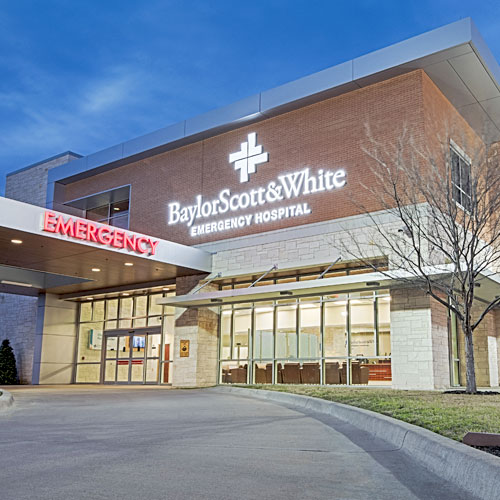
Baylor Scott & White Emergency Hospital - Keller
620 S Main St Ste 100, Keller, TX, 76248
Baylor Scott & White Hospital Medicine - All Saints
1400 8th Ave , Fort Worth, TX, 76104
Baylor Scott & White Hospital Medicine - Centennial
12505 Lebanon Rd Ste 1.124, Frisco, TX, 75035
Baylor Scott & White Hospital Medicine - Dallas
3600 Gaston Ave Suites 550 & 556, Dallas, TX, 75246
Baylor Scott & White Hospital Medicine - Grapevine
1650 W College St Ste 150, Grapevine, TX, 76051
Baylor Scott & White Hospital Medicine - Irving
2001 N MacArthur Blvd Ste 520, Irving, TX, 75061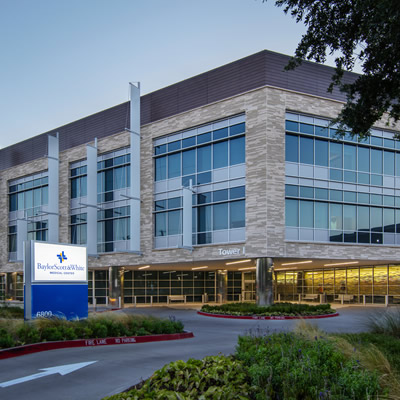
Baylor Scott & White Hospital Medicine - Lake Pointe
6800 Scenic Dr Ste 1071, Rowlett, TX, 75088
Baylor Scott & White Hospital Medicine - McKinney
5252 W University Dr Ste 3-226, McKinney, TX, 75071
Baylor Scott & White Hospital Medicine - Plano
4700 Alliance Blvd Ste 400, Plano, TX, 75093
Baylor Scott & White Hospital Medicine - Waxahachie
2400 N Interstate 35E , Waxahachie, TX, 75165
Baylor Scott & White Medical Center - Brenham
700 Medical Pkwy , Brenham, TX, 77833
Baylor Scott & White Medical Center - Centennial
12505 Lebanon Rd , Frisco, TX, 75035
Baylor Scott & White Medical Center - College Station
700 Scott and White Dr , College Station, TX, 77845
Baylor Scott & White Medical Center - College Station - Inpatient Medicine
700 Scott and White Dr , College Station, TX, 77845
Baylor Scott & White Medical Center - Hillcrest
100 Hillcrest Medical Blvd , Waco, TX, 76712
Baylor Scott & White Medical Center - Irving
1901 N MacArthur Blvd , Irving, TX, 75061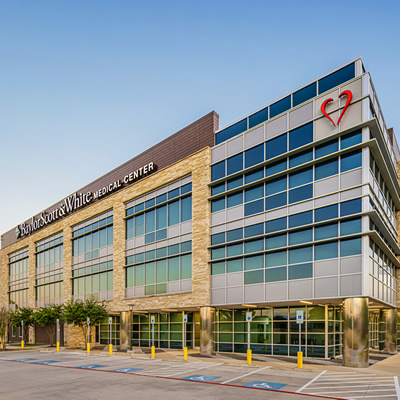
Baylor Scott & White Medical Center - Lake Pointe
6800 Scenic Dr , Rowlett, TX, 75088
Baylor Scott & White Medical Center - Marble Falls
810 W State Hwy 71 , Marble Falls, TX, 78654
Baylor Scott & White Medical Center - McKinney
5252 W University Dr Highway 380 at Lake Forest Drive, McKinney, TX, 75071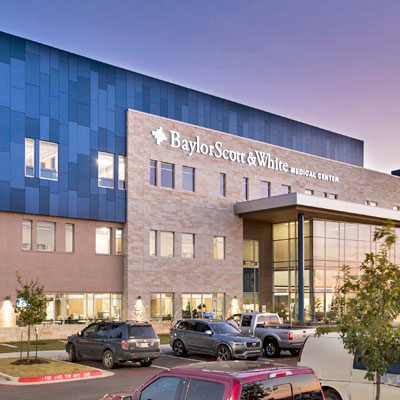
Baylor Scott & White Medical Center - Pflugerville
2600 E Pflugerville Pkwy Ste 100, Pflugerville, TX, 78660
Baylor Scott & White Medical Center - Plano
4700 Alliance Blvd , Plano, TX, 75093
Baylor Scott & White Medical Center - Round Rock
300 University Blvd , Round Rock, TX, 78665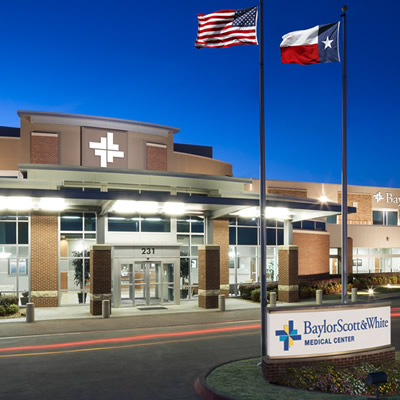
Baylor Scott & White Medical Center - Sunnyvale
231 S Collins Rd , Sunnyvale, TX, 75182
Baylor Scott & White Medical Center - Taylor
305 Mallard Ln , Taylor, TX, 76574
Baylor Scott & White Medical Center - Temple
2401 S 31st St , Temple, TX, 76508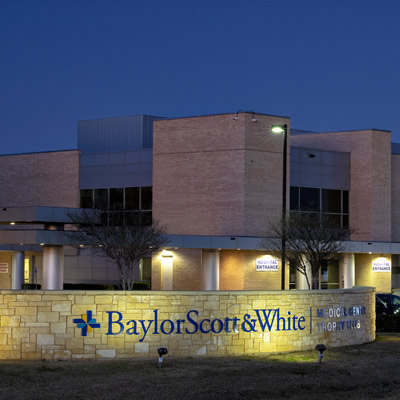
Baylor Scott & White Medical Center - Trophy Club
2850 E State Highway 114 , Trophy Club, TX, 76262
Baylor Scott & White Medical Center - Waxahachie
2400 N Interstate 35E , Waxahachie, TX, 75165